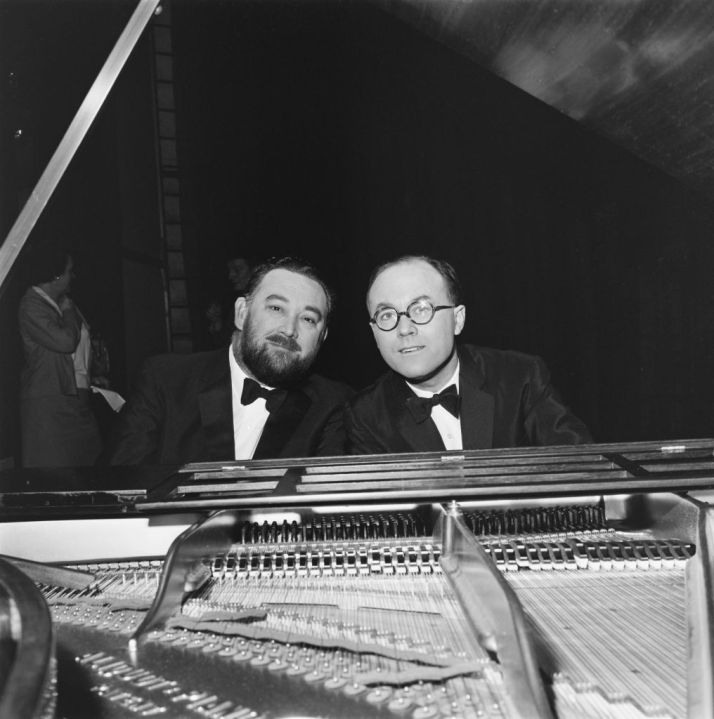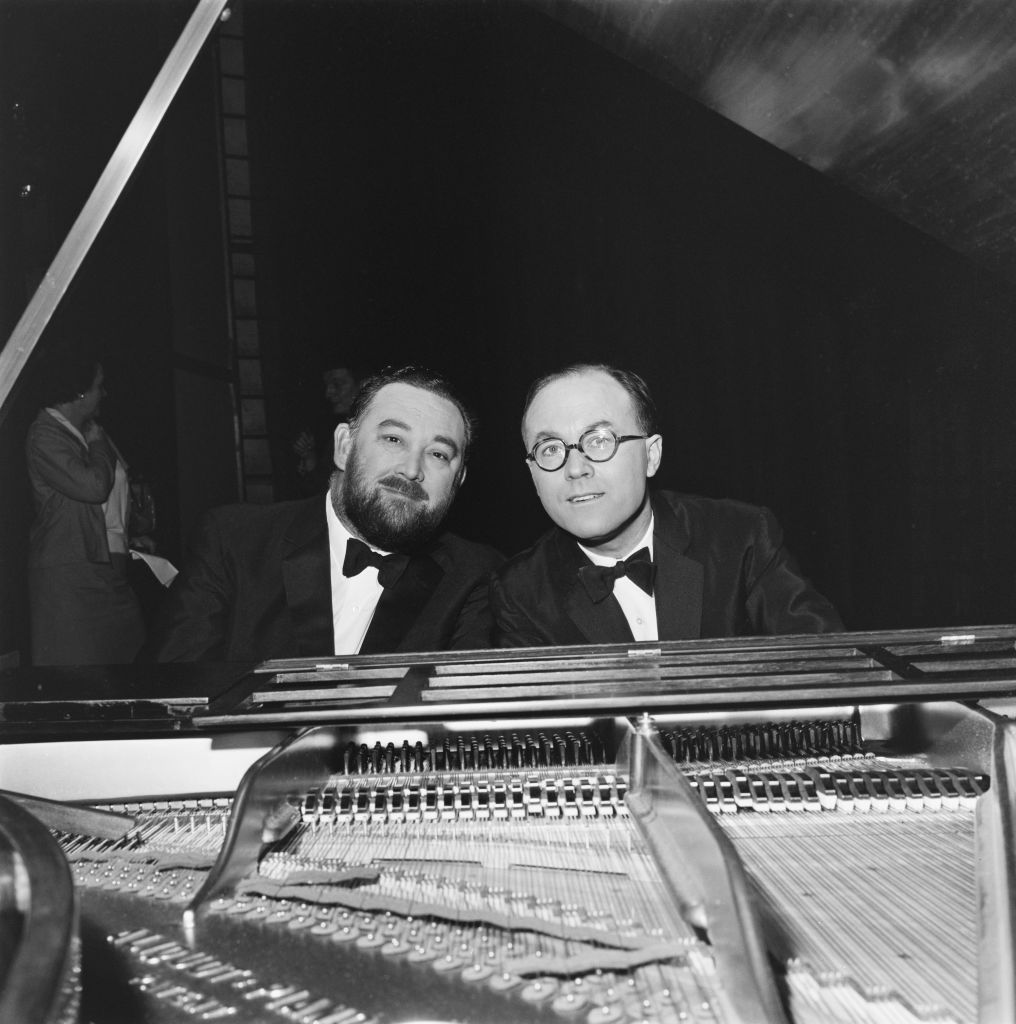War has had its apologians ever since history began,
From the times of the Greeks and Trojans when they sang of Arms and the Man,
(But if you ask me to name the best, sir, I’ll tell you the one I mean,
Head and shoulders above the rest, sir, was the War of 14-18)
If you’ve never heard Michael Flanders’s rollickingly good version of Georges Brassens ‘La Guerre de 14-18’ – an ironic take-down of the industrial-scale slaughter of the first world war, then you’re missing a treat. I first heard Flanders and Swann in my schooldays: I loved ‘The Gnu’, ‘The Hippopotamus Song (Mud, mud glorious mud)’ and ‘Misalliance (The Honeysuckle and the Bindweed)’.
Their more gentle brand of social commentary has aged considerably better than many of their more modern contemporaries
But it was only since buying the three-disc ‘Complete Flanders and Swann’ (containing ‘At the drop of a Hat’, ‘At the drop of Another Hat’ and ‘The Bestiary of Flanders & Swann’) at an Oxfam shop shortly before Christmas that I’ve appreciated the full extent of their genius. Although it’s almost 50 years now since Michael Flanders died (1975), and 30 this March since Donald Swann departed, their work, far from being old hat, remains as relevant as ever. Particularly their often overlooked anti-war songs which are a much-needed antidote to the warmongering that’s been doing the rounds this winter.
Unlike gung-ho commentators who talk nonchalantly about the inevitability of another world war, with either nuclear-armed Russia, nuclear-armed China and/or Iran – or possibly all three at the same time – and tell us all to prepare for it, Flanders and Swann were from a generation who knew the realities of armed conflict.
Flanders survived a torpedo attack while serving in the Royal Naval Volunteer Reserve in the second world war. He then contracted polio and spent the rest of his life in a wheelchair. Swann, a conscientious objector, who told his tribunal ‘Christ would never sanction a war’ served with a Quaker Ambulance Unit in Egypt, Palestine and Greece. In the 1960s, Swann wheeled his musical partner along the Gloucester Road on a Aldermaston ‘Ban the Bomb’ march.
Michael and Donald put on their first show together at Westminster School, then evacuated to Exeter, in 1940. Their stage manager and lifelong close friend was one Anthony Wedgwood Benn, who became one of Britain’s most principled antiwar politicians. In 1972 Benn appeared on Flanders’s ‘This is Your Life’ (that would be a great watch today, but sadly seems to have been wiped), and chose ‘Slow Train’ – Flanders and Swann’s wonderfully poignant lament for the branch line railway stations lost due to Dr Beeching’s axe as one of his Desert Island Discs. One imagines ‘Wedgie’ would have been a big fan too of ‘20 Tons of TNT’, his school-friends’ powerful indictment of the nuclear arms race. In the last verse, F&S make it clear what they think should be happening in the place of billions being spent on weapons of mutual mass destruction. ‘Teach me how to love my neighbour, do to him as him to me, Share the fruits of all our labour. Twenty tons of TNT.’
The prospect of nuclear Armageddon rears its ugly head again in ‘The Ostrich’. With its head in the sand, the bird ignores the news that the world is on the brink of catastrophe. Then:
Boom!
(From a sheltered oasis a mile away, I observed that dreadful scene.)
And a single plume came floating down
Where my ostrich friend had been because he could not bear the sound
Of these words I had left unsaid
Here in this nuclear testing ground
Is no place to bury your head!
In ‘The War of 14-18’, Flanders actually enhances Brassens’s original because he includes more references to specific wars – including the Boer War (‘a poor war’), Britain’s war in Suez (‘that wasn’t really a war at all’) and ‘the one we’ve had all the news from, liberating the Vietnamese’. Again, one can only admire the irony and Flanders’s Gilbertian ability to find a rhyme. Listening to it made me reflect how anti-war voices, part of a long and noble tradition in our history – were tolerated much more in the mainstream during the old ‘Cold War’ – and indeed just beyond it – than they are today.
The pacifist Lord Donald Soper was a television and radio regular. Lord Fenner Brockway, a campaigner against conscription in world war one, was still agitating for disarmament. Dickie Attenborough made ‘Oh! What a Lovely War’ and Tony Richardson skewered the foolhardy jingoism of the Crimean War in ‘The Charge of the Light Brigade’. Playwright Harold Pinter did his bit too, while all the time F&S’s old Westminster chum Tony Benn could be relied upon to make passionate, eloquent speeches against military action.
Fast forward to the 2020s and it’s a very different story. Despite being totally vindicated on Iraq – and other wars too (does anyone still think Libya was a good idea?) – antiwar voices are disparaged, denigrated and generally excluded from the mainstream. All the talking heads who do get air-time seemingly agree that the only solution to the world’s problems is more bombing. (And then more bombing in response to the response of the bombing)
How did we get here? Why isn’t the counter-view – the fundamentally Christian view for peace on Earth and goodwill towards all men – given a fair and proper hearing today? Isn’t our democracy the poorer for it?
Flanders and Swann were at their peak in the 1960s satire boom, but their more gentle brand of social commentary has aged considerably better than many of their more modern contemporaries who didn’t wear dinner jackets, bow-ties and boaters. ‘The Chameleon’ could easily have been written about Sir Keir Starmer – or indeed any other of the flip-flop politicians of today.
Consider the Chameleon, he colours
Himself and his opinions by the company’s he’s in
In Belfast he’s an Orangeman, the shade is quite ephemeral
Directly he moves south, it fades, In Dublin, look; He’s emerald.
While in the hilarious ‘Pxx Px Bxxxx Bxx Dxxxxxx (Pee po belly bum drawers)’, they take aim at the growing modishness in avant garde circles for being rude and using four-letter words. ‘If they all come into common use, we’ll have nothing left for special occasions,’ quipped Flanders. Again, fast forward to 2024 and it seems to be a successful comedian you simply have to clip on a microphone and say ‘fuck’ as many times as you can as you stride around the stage. Wit has been the great loser of these changes. In 50 years we’ve gone from the inventiveness of Michael Flanders imagining what a sloth would do if only it had the time – ‘I could climb the very highest Himalayas, be among the greatest ever tennis players, win at chess, or marry a princess or study hard and be an eminent professor’ – to a comedian joking on Radio 4 that battery acid and not milkshakes should be thrown at politicians like Nigel Farage.
Of course, Flanders and Swann weren’t living in a vacuum. They were part of a far richer world of light entertainment which existed in postwar Britain before the dumbing down of our cultural life began when comedy became colder and nastier. It was a time when intelligent, civilising ‘parlour games and panel shows like Call My Bluff, Animal, Vegetable, Mineral? and Face the Music, were staples of the television schedules. ‘Good lyrics and tunes, wit and imagination, no malice, no blue jokes, treating the audience as if it were literate: Donald and Michael can be flip but basically they are good chaps,’ says John Amis in his CD sleeve notes. Is it asking too much to hope for a revival? Well, in 2021, it was heartening to see the youngest-ever Mastermind champion, 24-year-old Jonathan Gibson, a PhD student at St Andrews, chose Flanders and Swann as his specialist subject in the grand final. He scored 11 out of 11. Perhaps there’s still a chance then that a new generation will discover the work of two of our finest entertainers – and that by doing so, we can yet avoid the fate of the ostrich.







Comments